Exploring Moral Development: A Comparison of Piaget & Kohlberg
VerifiedAdded on 2023/06/15
|9
|2211
|455
Essay
AI Summary
This essay provides a critical evaluation of Jean Piaget's and Lawrence Kohlberg's theories of moral development, focusing on how these theories explain the stages children follow in developing moral reasoning and behavior. It examines Piaget's emphasis on the shift from outcome-based to intent-based moral evaluations and Kohlberg's six stages of moral development. The essay compares and contrasts the two theories, highlighting their strengths and limitations based on research evidence. It also addresses criticisms, such as the gender bias in Kohlberg's theory and the methodological limitations in both theories. The analysis concludes that moral development is a complex phenomenon requiring culturally and situationally specific assessment tools. Desklib provides a platform for students to access similar solved assignments and study resources.
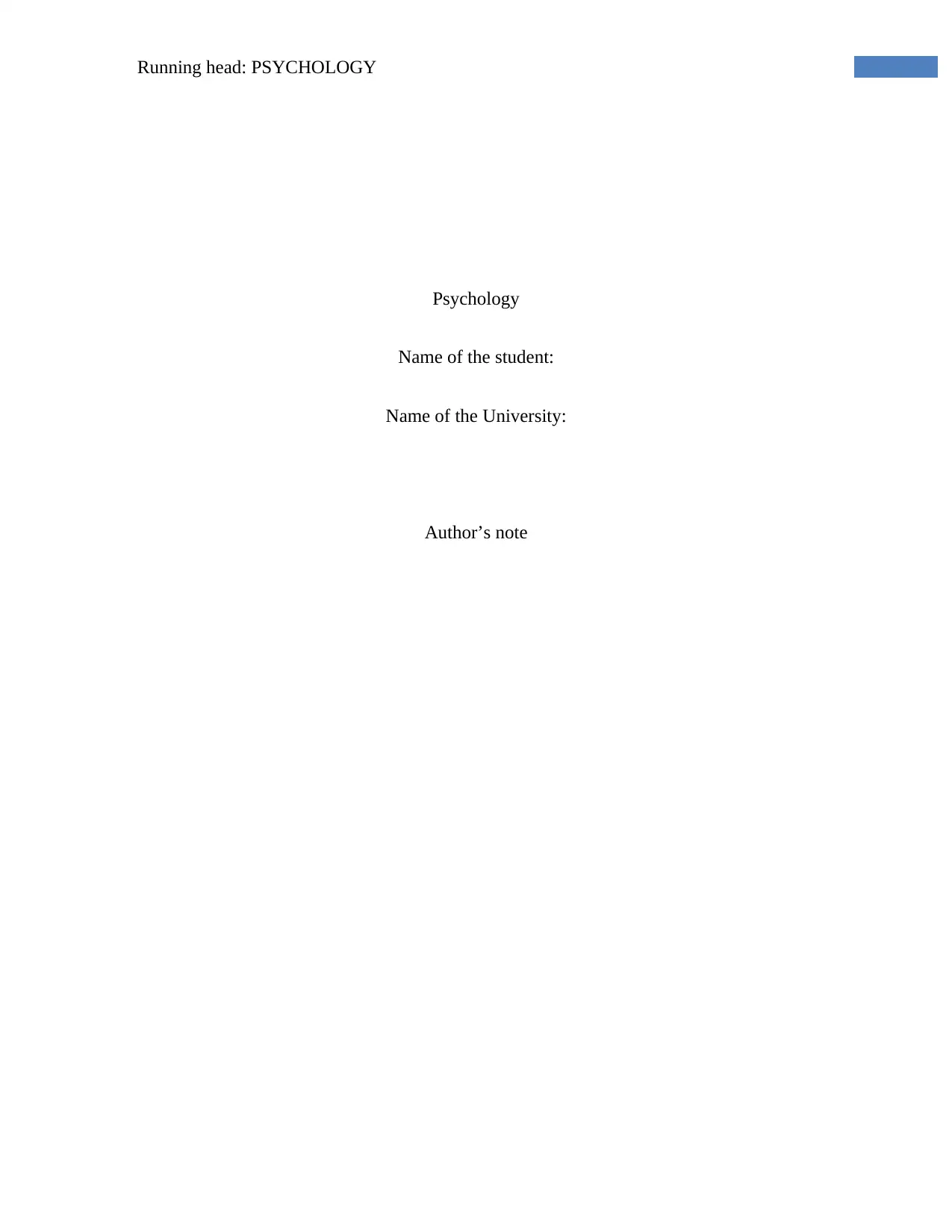
Running head: PSYCHOLOGY
Psychology
Name of the student:
Name of the University:
Author’s note
Psychology
Name of the student:
Name of the University:
Author’s note
Paraphrase This Document
Need a fresh take? Get an instant paraphrase of this document with our AI Paraphraser
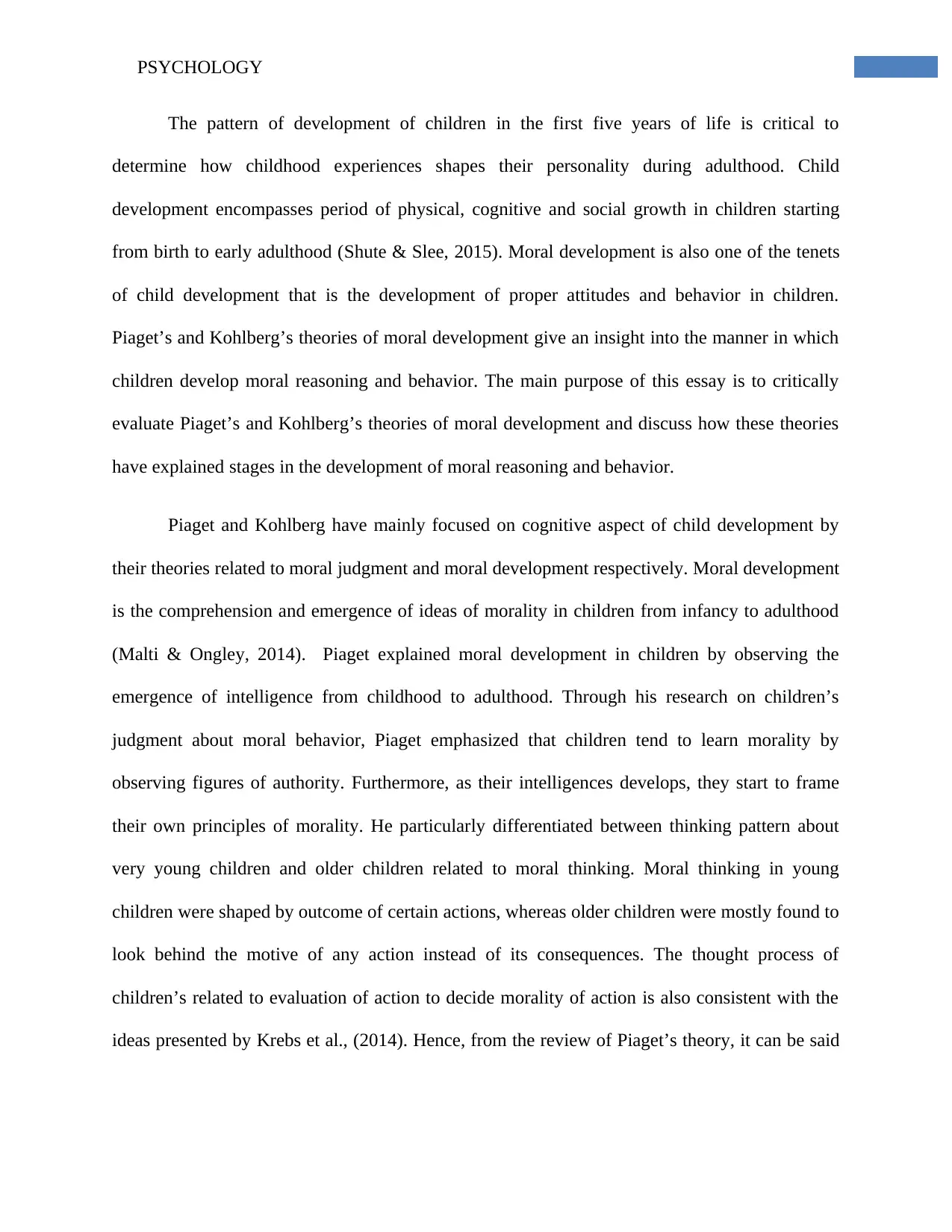
1PSYCHOLOGY
The pattern of development of children in the first five years of life is critical to
determine how childhood experiences shapes their personality during adulthood. Child
development encompasses period of physical, cognitive and social growth in children starting
from birth to early adulthood (Shute & Slee, 2015). Moral development is also one of the tenets
of child development that is the development of proper attitudes and behavior in children.
Piaget’s and Kohlberg’s theories of moral development give an insight into the manner in which
children develop moral reasoning and behavior. The main purpose of this essay is to critically
evaluate Piaget’s and Kohlberg’s theories of moral development and discuss how these theories
have explained stages in the development of moral reasoning and behavior.
Piaget and Kohlberg have mainly focused on cognitive aspect of child development by
their theories related to moral judgment and moral development respectively. Moral development
is the comprehension and emergence of ideas of morality in children from infancy to adulthood
(Malti & Ongley, 2014). Piaget explained moral development in children by observing the
emergence of intelligence from childhood to adulthood. Through his research on children’s
judgment about moral behavior, Piaget emphasized that children tend to learn morality by
observing figures of authority. Furthermore, as their intelligences develops, they start to frame
their own principles of morality. He particularly differentiated between thinking pattern about
very young children and older children related to moral thinking. Moral thinking in young
children were shaped by outcome of certain actions, whereas older children were mostly found to
look behind the motive of any action instead of its consequences. The thought process of
children’s related to evaluation of action to decide morality of action is also consistent with the
ideas presented by Krebs et al., (2014). Hence, from the review of Piaget’s theory, it can be said
The pattern of development of children in the first five years of life is critical to
determine how childhood experiences shapes their personality during adulthood. Child
development encompasses period of physical, cognitive and social growth in children starting
from birth to early adulthood (Shute & Slee, 2015). Moral development is also one of the tenets
of child development that is the development of proper attitudes and behavior in children.
Piaget’s and Kohlberg’s theories of moral development give an insight into the manner in which
children develop moral reasoning and behavior. The main purpose of this essay is to critically
evaluate Piaget’s and Kohlberg’s theories of moral development and discuss how these theories
have explained stages in the development of moral reasoning and behavior.
Piaget and Kohlberg have mainly focused on cognitive aspect of child development by
their theories related to moral judgment and moral development respectively. Moral development
is the comprehension and emergence of ideas of morality in children from infancy to adulthood
(Malti & Ongley, 2014). Piaget explained moral development in children by observing the
emergence of intelligence from childhood to adulthood. Through his research on children’s
judgment about moral behavior, Piaget emphasized that children tend to learn morality by
observing figures of authority. Furthermore, as their intelligences develops, they start to frame
their own principles of morality. He particularly differentiated between thinking pattern about
very young children and older children related to moral thinking. Moral thinking in young
children were shaped by outcome of certain actions, whereas older children were mostly found to
look behind the motive of any action instead of its consequences. The thought process of
children’s related to evaluation of action to decide morality of action is also consistent with the
ideas presented by Krebs et al., (2014). Hence, from the review of Piaget’s theory, it can be said
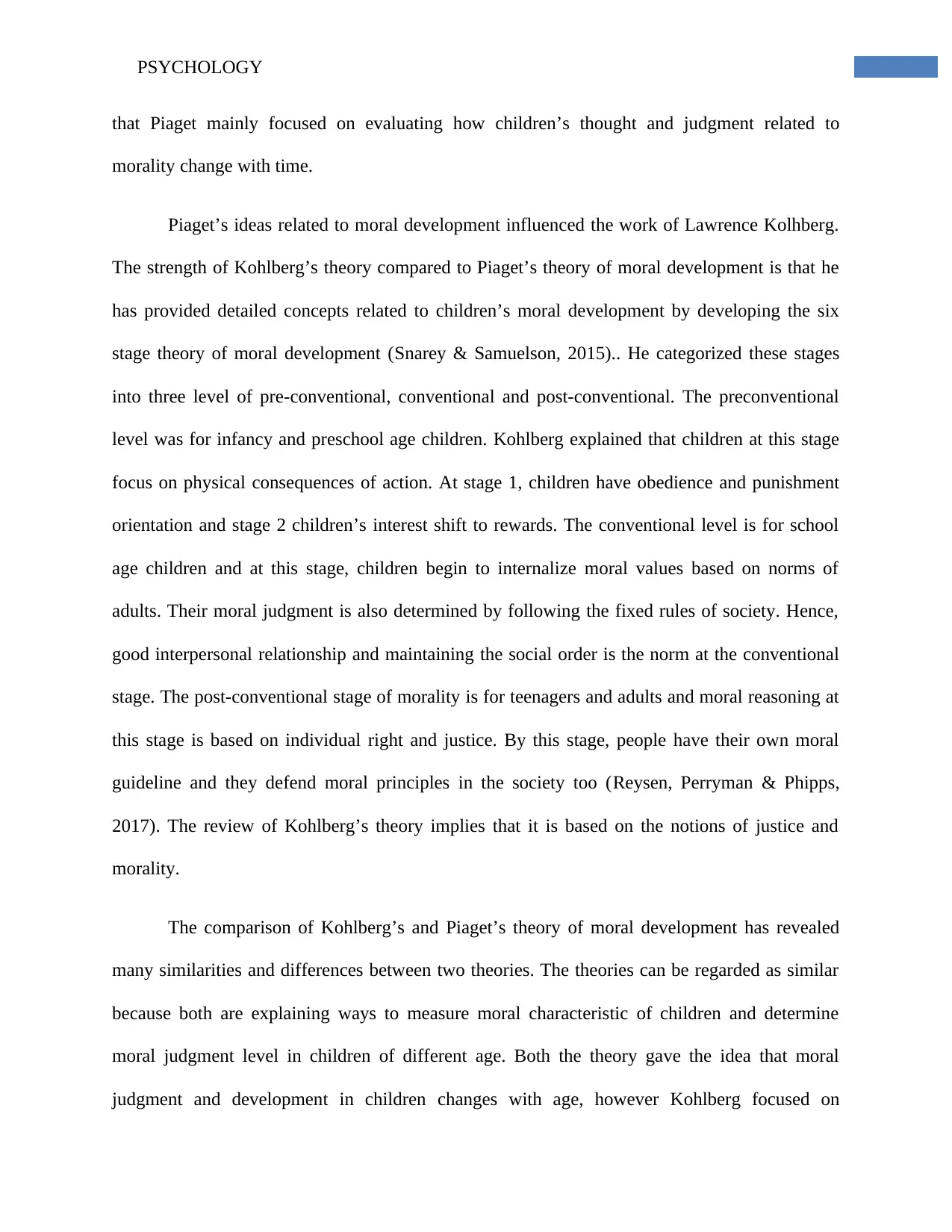
2PSYCHOLOGY
that Piaget mainly focused on evaluating how children’s thought and judgment related to
morality change with time.
Piaget’s ideas related to moral development influenced the work of Lawrence Kolhberg.
The strength of Kohlberg’s theory compared to Piaget’s theory of moral development is that he
has provided detailed concepts related to children’s moral development by developing the six
stage theory of moral development (Snarey & Samuelson, 2015).. He categorized these stages
into three level of pre-conventional, conventional and post-conventional. The preconventional
level was for infancy and preschool age children. Kohlberg explained that children at this stage
focus on physical consequences of action. At stage 1, children have obedience and punishment
orientation and stage 2 children’s interest shift to rewards. The conventional level is for school
age children and at this stage, children begin to internalize moral values based on norms of
adults. Their moral judgment is also determined by following the fixed rules of society. Hence,
good interpersonal relationship and maintaining the social order is the norm at the conventional
stage. The post-conventional stage of morality is for teenagers and adults and moral reasoning at
this stage is based on individual right and justice. By this stage, people have their own moral
guideline and they defend moral principles in the society too (Reysen, Perryman & Phipps,
2017). The review of Kohlberg’s theory implies that it is based on the notions of justice and
morality.
The comparison of Kohlberg’s and Piaget’s theory of moral development has revealed
many similarities and differences between two theories. The theories can be regarded as similar
because both are explaining ways to measure moral characteristic of children and determine
moral judgment level in children of different age. Both the theory gave the idea that moral
judgment and development in children changes with age, however Kohlberg focused on
that Piaget mainly focused on evaluating how children’s thought and judgment related to
morality change with time.
Piaget’s ideas related to moral development influenced the work of Lawrence Kolhberg.
The strength of Kohlberg’s theory compared to Piaget’s theory of moral development is that he
has provided detailed concepts related to children’s moral development by developing the six
stage theory of moral development (Snarey & Samuelson, 2015).. He categorized these stages
into three level of pre-conventional, conventional and post-conventional. The preconventional
level was for infancy and preschool age children. Kohlberg explained that children at this stage
focus on physical consequences of action. At stage 1, children have obedience and punishment
orientation and stage 2 children’s interest shift to rewards. The conventional level is for school
age children and at this stage, children begin to internalize moral values based on norms of
adults. Their moral judgment is also determined by following the fixed rules of society. Hence,
good interpersonal relationship and maintaining the social order is the norm at the conventional
stage. The post-conventional stage of morality is for teenagers and adults and moral reasoning at
this stage is based on individual right and justice. By this stage, people have their own moral
guideline and they defend moral principles in the society too (Reysen, Perryman & Phipps,
2017). The review of Kohlberg’s theory implies that it is based on the notions of justice and
morality.
The comparison of Kohlberg’s and Piaget’s theory of moral development has revealed
many similarities and differences between two theories. The theories can be regarded as similar
because both are explaining ways to measure moral characteristic of children and determine
moral judgment level in children of different age. Both the theory gave the idea that moral
judgment and development in children changes with age, however Kohlberg focused on
⊘ This is a preview!⊘
Do you want full access?
Subscribe today to unlock all pages.

Trusted by 1+ million students worldwide
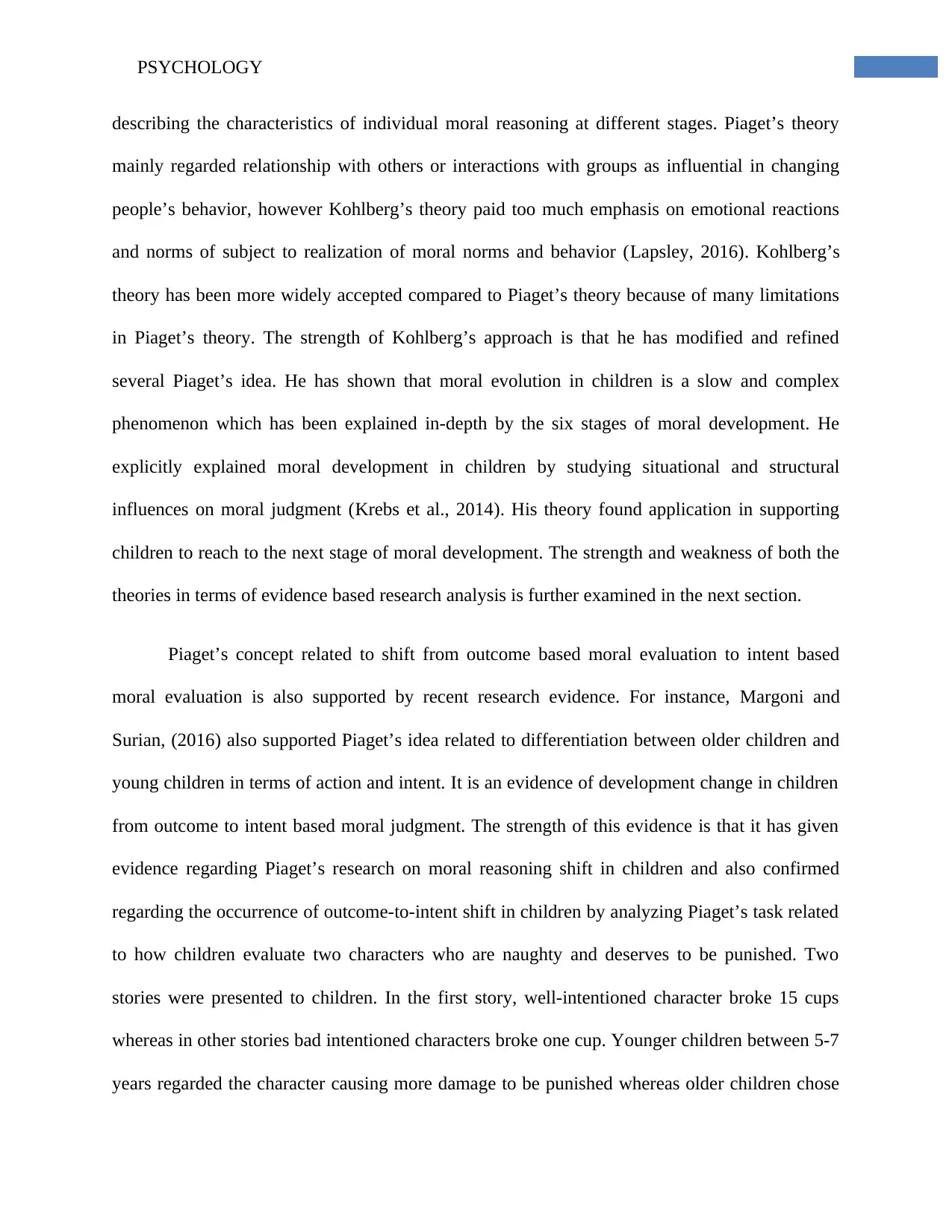
3PSYCHOLOGY
describing the characteristics of individual moral reasoning at different stages. Piaget’s theory
mainly regarded relationship with others or interactions with groups as influential in changing
people’s behavior, however Kohlberg’s theory paid too much emphasis on emotional reactions
and norms of subject to realization of moral norms and behavior (Lapsley, 2016). Kohlberg’s
theory has been more widely accepted compared to Piaget’s theory because of many limitations
in Piaget’s theory. The strength of Kohlberg’s approach is that he has modified and refined
several Piaget’s idea. He has shown that moral evolution in children is a slow and complex
phenomenon which has been explained in-depth by the six stages of moral development. He
explicitly explained moral development in children by studying situational and structural
influences on moral judgment (Krebs et al., 2014). His theory found application in supporting
children to reach to the next stage of moral development. The strength and weakness of both the
theories in terms of evidence based research analysis is further examined in the next section.
Piaget’s concept related to shift from outcome based moral evaluation to intent based
moral evaluation is also supported by recent research evidence. For instance, Margoni and
Surian, (2016) also supported Piaget’s idea related to differentiation between older children and
young children in terms of action and intent. It is an evidence of development change in children
from outcome to intent based moral judgment. The strength of this evidence is that it has given
evidence regarding Piaget’s research on moral reasoning shift in children and also confirmed
regarding the occurrence of outcome-to-intent shift in children by analyzing Piaget’s task related
to how children evaluate two characters who are naughty and deserves to be punished. Two
stories were presented to children. In the first story, well-intentioned character broke 15 cups
whereas in other stories bad intentioned characters broke one cup. Younger children between 5-7
years regarded the character causing more damage to be punished whereas older children chose
describing the characteristics of individual moral reasoning at different stages. Piaget’s theory
mainly regarded relationship with others or interactions with groups as influential in changing
people’s behavior, however Kohlberg’s theory paid too much emphasis on emotional reactions
and norms of subject to realization of moral norms and behavior (Lapsley, 2016). Kohlberg’s
theory has been more widely accepted compared to Piaget’s theory because of many limitations
in Piaget’s theory. The strength of Kohlberg’s approach is that he has modified and refined
several Piaget’s idea. He has shown that moral evolution in children is a slow and complex
phenomenon which has been explained in-depth by the six stages of moral development. He
explicitly explained moral development in children by studying situational and structural
influences on moral judgment (Krebs et al., 2014). His theory found application in supporting
children to reach to the next stage of moral development. The strength and weakness of both the
theories in terms of evidence based research analysis is further examined in the next section.
Piaget’s concept related to shift from outcome based moral evaluation to intent based
moral evaluation is also supported by recent research evidence. For instance, Margoni and
Surian, (2016) also supported Piaget’s idea related to differentiation between older children and
young children in terms of action and intent. It is an evidence of development change in children
from outcome to intent based moral judgment. The strength of this evidence is that it has given
evidence regarding Piaget’s research on moral reasoning shift in children and also confirmed
regarding the occurrence of outcome-to-intent shift in children by analyzing Piaget’s task related
to how children evaluate two characters who are naughty and deserves to be punished. Two
stories were presented to children. In the first story, well-intentioned character broke 15 cups
whereas in other stories bad intentioned characters broke one cup. Younger children between 5-7
years regarded the character causing more damage to be punished whereas older children chose
Paraphrase This Document
Need a fresh take? Get an instant paraphrase of this document with our AI Paraphraser
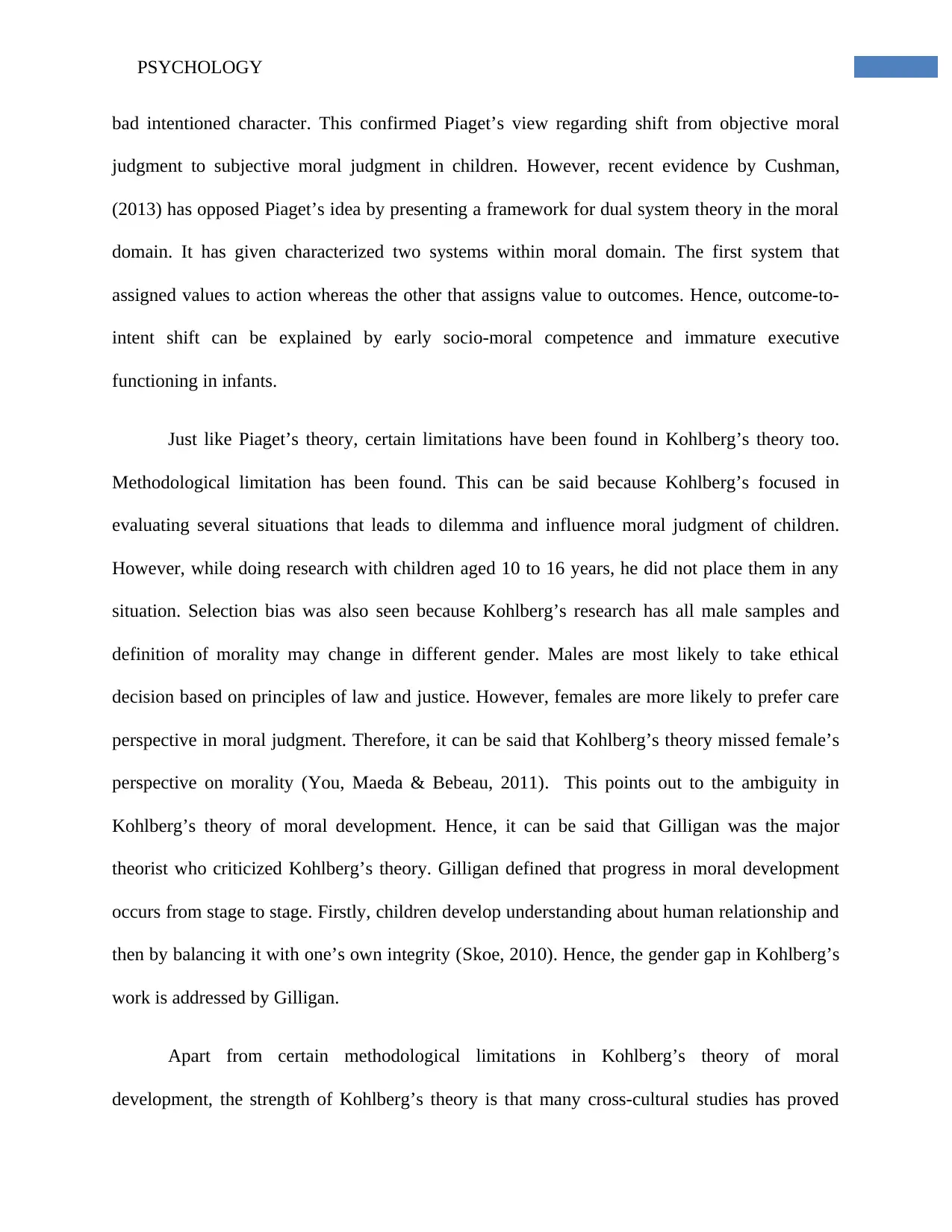
4PSYCHOLOGY
bad intentioned character. This confirmed Piaget’s view regarding shift from objective moral
judgment to subjective moral judgment in children. However, recent evidence by Cushman,
(2013) has opposed Piaget’s idea by presenting a framework for dual system theory in the moral
domain. It has given characterized two systems within moral domain. The first system that
assigned values to action whereas the other that assigns value to outcomes. Hence, outcome-to-
intent shift can be explained by early socio-moral competence and immature executive
functioning in infants.
Just like Piaget’s theory, certain limitations have been found in Kohlberg’s theory too.
Methodological limitation has been found. This can be said because Kohlberg’s focused in
evaluating several situations that leads to dilemma and influence moral judgment of children.
However, while doing research with children aged 10 to 16 years, he did not place them in any
situation. Selection bias was also seen because Kohlberg’s research has all male samples and
definition of morality may change in different gender. Males are most likely to take ethical
decision based on principles of law and justice. However, females are more likely to prefer care
perspective in moral judgment. Therefore, it can be said that Kohlberg’s theory missed female’s
perspective on morality (You, Maeda & Bebeau, 2011). This points out to the ambiguity in
Kohlberg’s theory of moral development. Hence, it can be said that Gilligan was the major
theorist who criticized Kohlberg’s theory. Gilligan defined that progress in moral development
occurs from stage to stage. Firstly, children develop understanding about human relationship and
then by balancing it with one’s own integrity (Skoe, 2010). Hence, the gender gap in Kohlberg’s
work is addressed by Gilligan.
Apart from certain methodological limitations in Kohlberg’s theory of moral
development, the strength of Kohlberg’s theory is that many cross-cultural studies has proved
bad intentioned character. This confirmed Piaget’s view regarding shift from objective moral
judgment to subjective moral judgment in children. However, recent evidence by Cushman,
(2013) has opposed Piaget’s idea by presenting a framework for dual system theory in the moral
domain. It has given characterized two systems within moral domain. The first system that
assigned values to action whereas the other that assigns value to outcomes. Hence, outcome-to-
intent shift can be explained by early socio-moral competence and immature executive
functioning in infants.
Just like Piaget’s theory, certain limitations have been found in Kohlberg’s theory too.
Methodological limitation has been found. This can be said because Kohlberg’s focused in
evaluating several situations that leads to dilemma and influence moral judgment of children.
However, while doing research with children aged 10 to 16 years, he did not place them in any
situation. Selection bias was also seen because Kohlberg’s research has all male samples and
definition of morality may change in different gender. Males are most likely to take ethical
decision based on principles of law and justice. However, females are more likely to prefer care
perspective in moral judgment. Therefore, it can be said that Kohlberg’s theory missed female’s
perspective on morality (You, Maeda & Bebeau, 2011). This points out to the ambiguity in
Kohlberg’s theory of moral development. Hence, it can be said that Gilligan was the major
theorist who criticized Kohlberg’s theory. Gilligan defined that progress in moral development
occurs from stage to stage. Firstly, children develop understanding about human relationship and
then by balancing it with one’s own integrity (Skoe, 2010). Hence, the gender gap in Kohlberg’s
work is addressed by Gilligan.
Apart from certain methodological limitations in Kohlberg’s theory of moral
development, the strength of Kohlberg’s theory is that many cross-cultural studies has proved
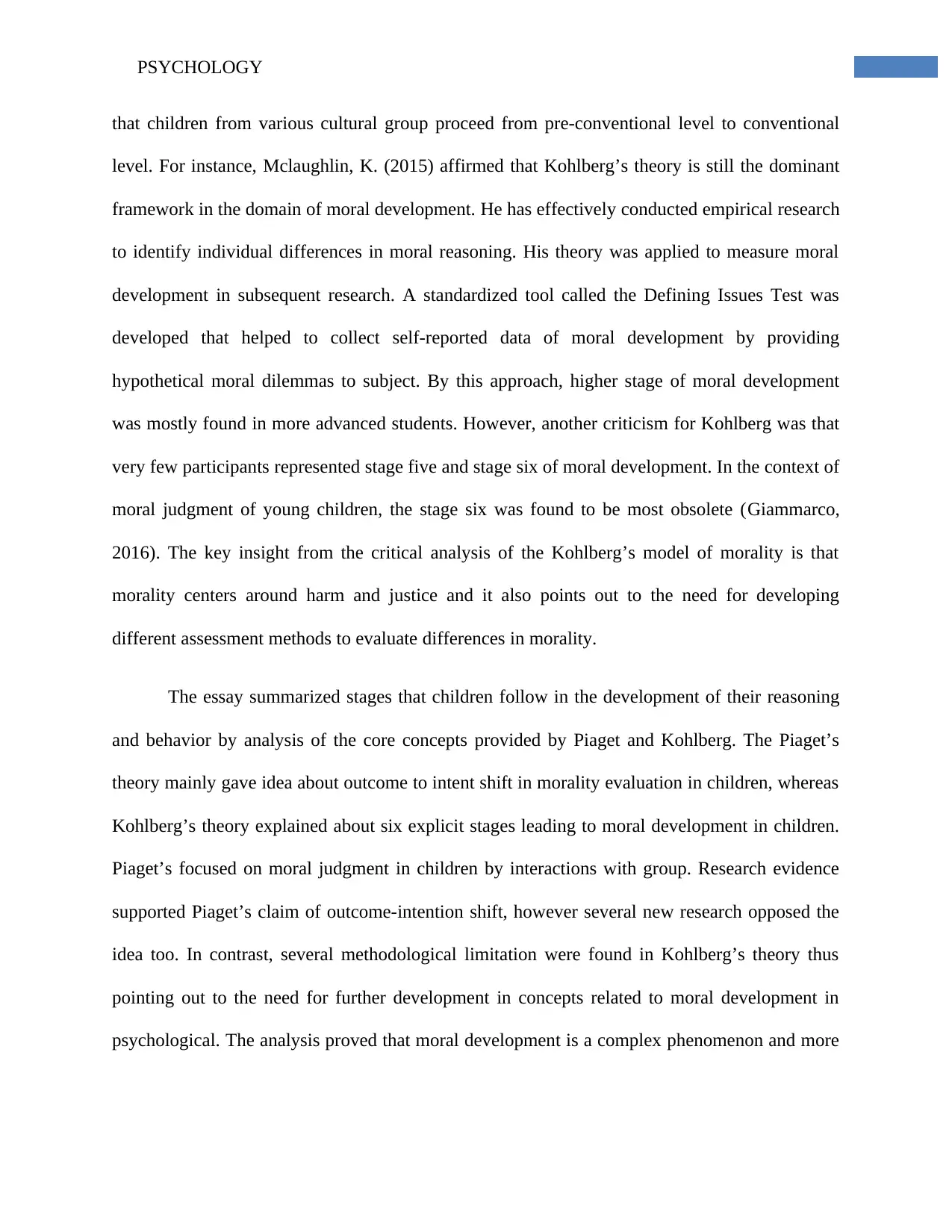
5PSYCHOLOGY
that children from various cultural group proceed from pre-conventional level to conventional
level. For instance, Mclaughlin, K. (2015) affirmed that Kohlberg’s theory is still the dominant
framework in the domain of moral development. He has effectively conducted empirical research
to identify individual differences in moral reasoning. His theory was applied to measure moral
development in subsequent research. A standardized tool called the Defining Issues Test was
developed that helped to collect self-reported data of moral development by providing
hypothetical moral dilemmas to subject. By this approach, higher stage of moral development
was mostly found in more advanced students. However, another criticism for Kohlberg was that
very few participants represented stage five and stage six of moral development. In the context of
moral judgment of young children, the stage six was found to be most obsolete (Giammarco,
2016). The key insight from the critical analysis of the Kohlberg’s model of morality is that
morality centers around harm and justice and it also points out to the need for developing
different assessment methods to evaluate differences in morality.
The essay summarized stages that children follow in the development of their reasoning
and behavior by analysis of the core concepts provided by Piaget and Kohlberg. The Piaget’s
theory mainly gave idea about outcome to intent shift in morality evaluation in children, whereas
Kohlberg’s theory explained about six explicit stages leading to moral development in children.
Piaget’s focused on moral judgment in children by interactions with group. Research evidence
supported Piaget’s claim of outcome-intention shift, however several new research opposed the
idea too. In contrast, several methodological limitation were found in Kohlberg’s theory thus
pointing out to the need for further development in concepts related to moral development in
psychological. The analysis proved that moral development is a complex phenomenon and more
that children from various cultural group proceed from pre-conventional level to conventional
level. For instance, Mclaughlin, K. (2015) affirmed that Kohlberg’s theory is still the dominant
framework in the domain of moral development. He has effectively conducted empirical research
to identify individual differences in moral reasoning. His theory was applied to measure moral
development in subsequent research. A standardized tool called the Defining Issues Test was
developed that helped to collect self-reported data of moral development by providing
hypothetical moral dilemmas to subject. By this approach, higher stage of moral development
was mostly found in more advanced students. However, another criticism for Kohlberg was that
very few participants represented stage five and stage six of moral development. In the context of
moral judgment of young children, the stage six was found to be most obsolete (Giammarco,
2016). The key insight from the critical analysis of the Kohlberg’s model of morality is that
morality centers around harm and justice and it also points out to the need for developing
different assessment methods to evaluate differences in morality.
The essay summarized stages that children follow in the development of their reasoning
and behavior by analysis of the core concepts provided by Piaget and Kohlberg. The Piaget’s
theory mainly gave idea about outcome to intent shift in morality evaluation in children, whereas
Kohlberg’s theory explained about six explicit stages leading to moral development in children.
Piaget’s focused on moral judgment in children by interactions with group. Research evidence
supported Piaget’s claim of outcome-intention shift, however several new research opposed the
idea too. In contrast, several methodological limitation were found in Kohlberg’s theory thus
pointing out to the need for further development in concepts related to moral development in
psychological. The analysis proved that moral development is a complex phenomenon and more
⊘ This is a preview!⊘
Do you want full access?
Subscribe today to unlock all pages.

Trusted by 1+ million students worldwide
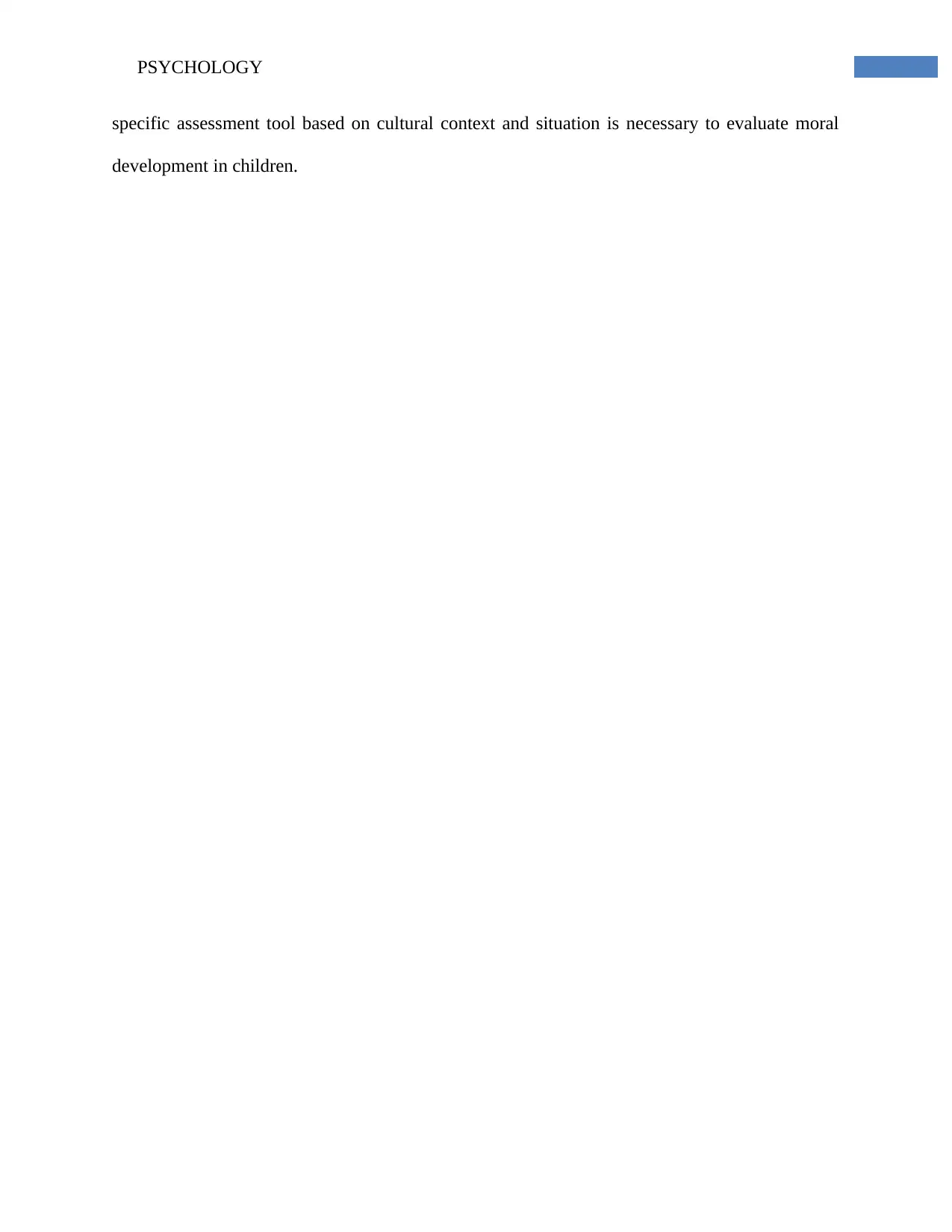
6PSYCHOLOGY
specific assessment tool based on cultural context and situation is necessary to evaluate moral
development in children.
specific assessment tool based on cultural context and situation is necessary to evaluate moral
development in children.
Paraphrase This Document
Need a fresh take? Get an instant paraphrase of this document with our AI Paraphraser
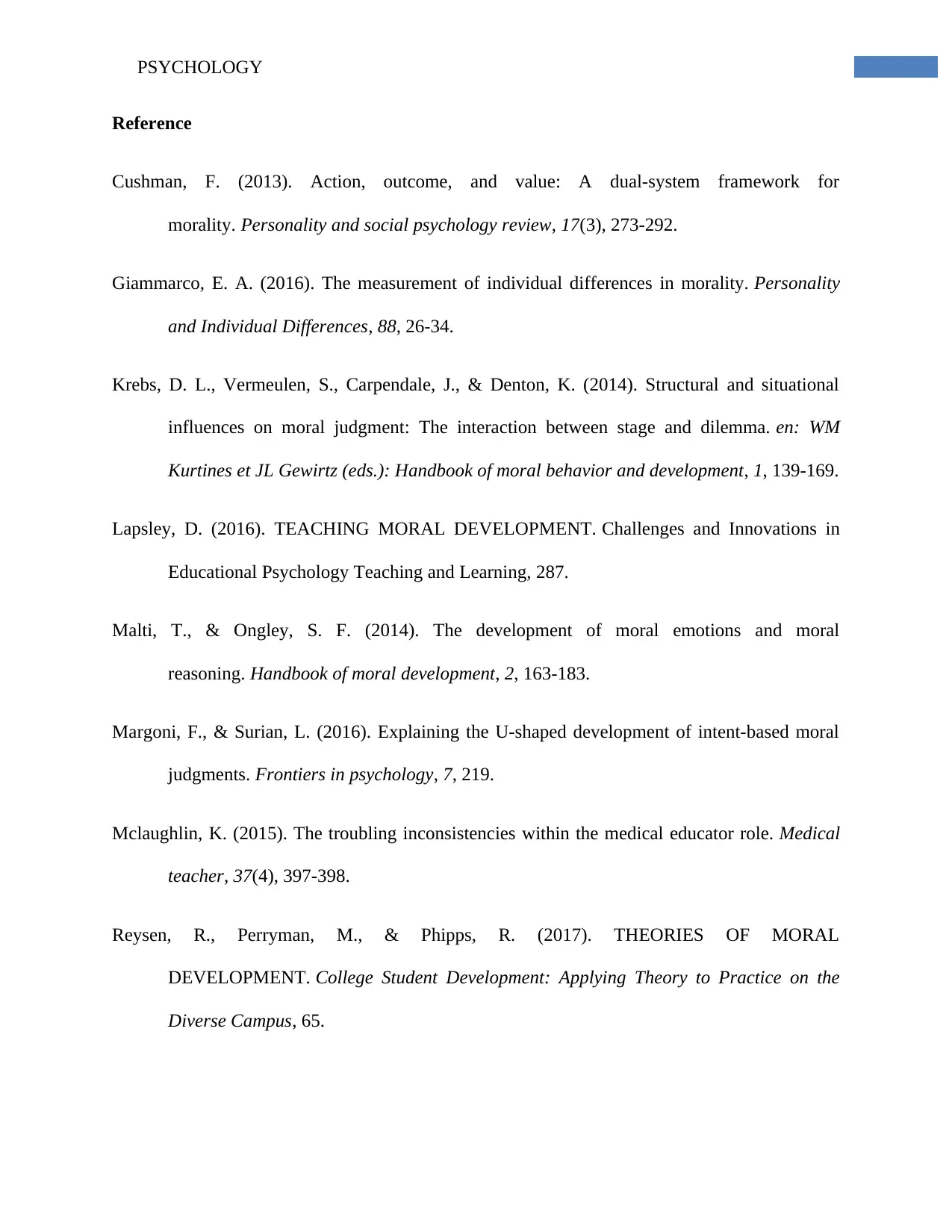
7PSYCHOLOGY
Reference
Cushman, F. (2013). Action, outcome, and value: A dual-system framework for
morality. Personality and social psychology review, 17(3), 273-292.
Giammarco, E. A. (2016). The measurement of individual differences in morality. Personality
and Individual Differences, 88, 26-34.
Krebs, D. L., Vermeulen, S., Carpendale, J., & Denton, K. (2014). Structural and situational
influences on moral judgment: The interaction between stage and dilemma. en: WM
Kurtines et JL Gewirtz (eds.): Handbook of moral behavior and development, 1, 139-169.
Lapsley, D. (2016). TEACHING MORAL DEVELOPMENT. Challenges and Innovations in
Educational Psychology Teaching and Learning, 287.
Malti, T., & Ongley, S. F. (2014). The development of moral emotions and moral
reasoning. Handbook of moral development, 2, 163-183.
Margoni, F., & Surian, L. (2016). Explaining the U-shaped development of intent-based moral
judgments. Frontiers in psychology, 7, 219.
Mclaughlin, K. (2015). The troubling inconsistencies within the medical educator role. Medical
teacher, 37(4), 397-398.
Reysen, R., Perryman, M., & Phipps, R. (2017). THEORIES OF MORAL
DEVELOPMENT. College Student Development: Applying Theory to Practice on the
Diverse Campus, 65.
Reference
Cushman, F. (2013). Action, outcome, and value: A dual-system framework for
morality. Personality and social psychology review, 17(3), 273-292.
Giammarco, E. A. (2016). The measurement of individual differences in morality. Personality
and Individual Differences, 88, 26-34.
Krebs, D. L., Vermeulen, S., Carpendale, J., & Denton, K. (2014). Structural and situational
influences on moral judgment: The interaction between stage and dilemma. en: WM
Kurtines et JL Gewirtz (eds.): Handbook of moral behavior and development, 1, 139-169.
Lapsley, D. (2016). TEACHING MORAL DEVELOPMENT. Challenges and Innovations in
Educational Psychology Teaching and Learning, 287.
Malti, T., & Ongley, S. F. (2014). The development of moral emotions and moral
reasoning. Handbook of moral development, 2, 163-183.
Margoni, F., & Surian, L. (2016). Explaining the U-shaped development of intent-based moral
judgments. Frontiers in psychology, 7, 219.
Mclaughlin, K. (2015). The troubling inconsistencies within the medical educator role. Medical
teacher, 37(4), 397-398.
Reysen, R., Perryman, M., & Phipps, R. (2017). THEORIES OF MORAL
DEVELOPMENT. College Student Development: Applying Theory to Practice on the
Diverse Campus, 65.
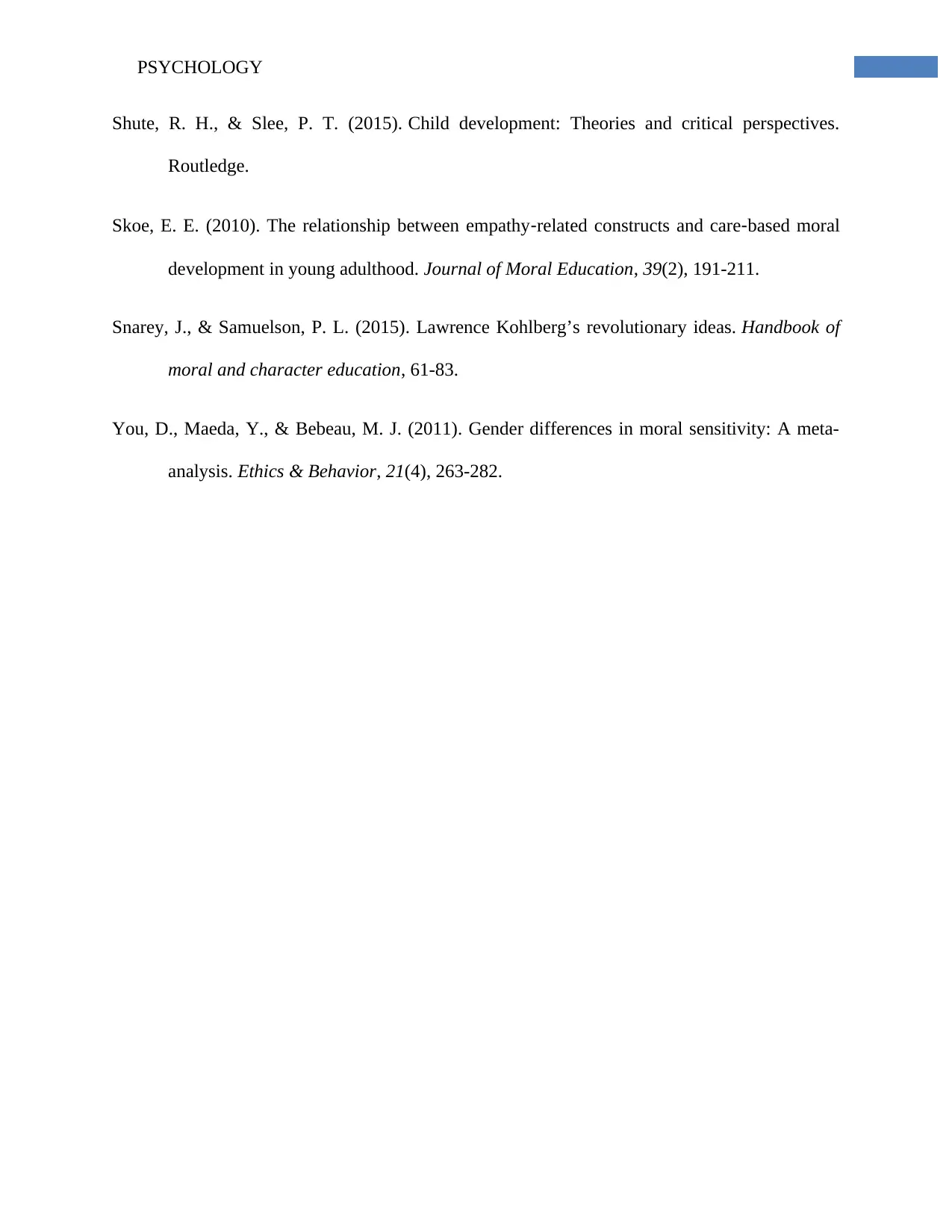
8PSYCHOLOGY
Shute, R. H., & Slee, P. T. (2015). Child development: Theories and critical perspectives.
Routledge.
Skoe, E. E. (2010). The relationship between empathy‐related constructs and care‐based moral
development in young adulthood. Journal of Moral Education, 39(2), 191-211.
Snarey, J., & Samuelson, P. L. (2015). Lawrence Kohlberg’s revolutionary ideas. Handbook of
moral and character education, 61-83.
You, D., Maeda, Y., & Bebeau, M. J. (2011). Gender differences in moral sensitivity: A meta-
analysis. Ethics & Behavior, 21(4), 263-282.
Shute, R. H., & Slee, P. T. (2015). Child development: Theories and critical perspectives.
Routledge.
Skoe, E. E. (2010). The relationship between empathy‐related constructs and care‐based moral
development in young adulthood. Journal of Moral Education, 39(2), 191-211.
Snarey, J., & Samuelson, P. L. (2015). Lawrence Kohlberg’s revolutionary ideas. Handbook of
moral and character education, 61-83.
You, D., Maeda, Y., & Bebeau, M. J. (2011). Gender differences in moral sensitivity: A meta-
analysis. Ethics & Behavior, 21(4), 263-282.
⊘ This is a preview!⊘
Do you want full access?
Subscribe today to unlock all pages.

Trusted by 1+ million students worldwide
1 out of 9
Related Documents
Your All-in-One AI-Powered Toolkit for Academic Success.
+13062052269
info@desklib.com
Available 24*7 on WhatsApp / Email
![[object Object]](/_next/static/media/star-bottom.7253800d.svg)
Unlock your academic potential
Copyright © 2020–2026 A2Z Services. All Rights Reserved. Developed and managed by ZUCOL.





